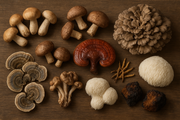
I recently wrote a detailed article on dogs' 11 most common food allergens. According to veterinarians, only 10% of allergies in dogs are caused by food.
However, there is robust empirical evidence from dog owners that changing their dog's diet solved their dog's allergies issues.
The reason why veterinarians claim that only 10% of allergies are food-related is that your dog may not be truly allergic to an ingredient and yet still have a reaction to it.
Humans sometimes are lactose-intolerant, like me, but not allergic to dairy. Unfortunately, intolerance leads to increased inflammation and many side effects in dogs, such as itching, scratch, licking, flaky skin, ear infections, etc.
I will first explain how you can reduce inflammation in your dog's body and boost your dog's immune system.
Disclaimer: The Content is not intended to be a substitute for professional veterinarian advice, diagnosis, or treatment. Always seek the advice of your veterinarian with any questions you may have regarding the medical condition of your pet. Never disregard professional advice or delay seeking it because of something you have read on this website!
How to reduce inflammation in your dog's body and diminish allergy-related symptoms

Inflammation is the body's immune system's response to an irritant. I often refer to the immune system more than inflammation, but they are the same thing: a robust immune system ensures that inflammation occurs less. It doesn't prevent the inflammation from happening, but it does limit its effect on your dog's health.
The best way to support an intolerance is double:
- Try to remove the intolerance as much as possible. Find the culprit and remove it from your dog's diet. Removing the allergen or irritant will directly reduce inflammation, and your dog will feel and look better.
- Strengthen your dog's immune system. Build your dog's defenses as much as you can using beneficial ingredients.
Sometimes, only completing one of the two steps is enough to see the allergy-related symptoms disappear.
How to remove allergens and irritants from your dog's diet

Here is a list of the top 11 allergens commonly found in dog food:
- Beef. Beef is commonly found in dog food and is at the top of our list.
- Dairy. Your dog may be lactose-intolerant or allergic to dairy. Symptoms are gas, vomiting, or diarrhea. If your dog is lactose-intolerant, he may only develop digestion issues and no skin issues. However, if your dog develops skin rashes, he may be allergic to dairy.
- Fish.
- Chicken. Another prevalent protein. Consider switching it out.
- Pork. Although less likely to cause allergies, pork is still a common culprit. Remember that dogs cannot eat raw pork, just like us, because of parasites.
- Rabbit.
- Wheat. It's more common to develop allergies to protein than to wheat and grains in general. However, it's still one of the familiar sources.
- Eggs. Eggs are not as commonly found in food, so they are easier to avoid. Your dog may be allergic to the protein in the egg yolk.
- Rice.
- Corn.
- Lamb. Lamb was considered an excellent alternative to beef and chicken and is unfortunately also the cause of allergies in some dogs.
- Soy. Soy has been linked to many health issues beyond allergies and should be avoided.
Most of the time, dogs are intolerant to the protein source. However, in fewer cases, the culprit is the grain. Therefore, please consider the following two groups:
- Proteins: beef, chicken, dairy, fish, pork, rabbit, eggs, lamb, soy.
- Grains: wheat, rice, corn.
I bolded the particular proteins and grains most commonly found in kibble and dogs' diets. Of course, many kibble recipes will include all of them: beef as the main ingredient, poultry by-product, soy, wheat, rice, and corn.
My method of removing allergens and irritants from your dog's diet is easy: start feeding your dog a new kibble or food void of the bolded ingredients.
My favorite go-to recipes include wild salmon and sweet potatoes. You can also pick from venison, duck, or even kangaroo.
There are plenty of options you can find online that do not contain common allergens. As an example, here are two kibble recipes I found.

I will mention the brand if it is helpful to you, but I do not receive any commission if you decide to buy. I should probably find a way to do so, but my goal is to help you unbiased.
- Canidae Pure Limited Ingredient Premium Adult Dry Dog Food, Salmon and Sweet Potatoes recipe: salmon, salmon meal, menhaden fish meal, lentils, sweet potatoes, garbanzo beans, peas, canola oil, potatoes, flaxseed, etc.
- ZIWI Peak Air-Dried Venison Recipe For Dogs: venison, venison tripe, venison heart, venison lung, venison liver, venison kidney, New Zealand green mussel, venison bone, lecithin, inulin from chicory, dried kelp, minerals, etc.
My goal is not to recommend a particular brand over another but instead to help you understand how you can choose a new kibble on your own, knowing what should be in the ingredients and what should not be.
Changing your dog's diet to a new one void of these irritants and allergens is enough to see a drastic change in your dog's health. However, there is more than you can do: let's see how you can boost your dog's immune system.
How to strengthen your dog's immune system

If the first method was about "removing" harmful ingredients, my second method is about "adding" beneficial ones. The combination of both is very effective.
I found the single most-effective immune-boosting ingredient in all my research was Omega 3 fatty acids.
Omega 3 fatty acids are considered healthy fats, and your dog cannot synthesize Omega 3s on his own.
Human studies report the following anti-inflammatory benefits (source):
- Long-term inflammation can contribute to almost every chronic Western illness, including heart disease and cancer (Source, Source, Source).
- Notably, omega-3 fatty acids can reduce the production of molecules and substances linked to inflammation, such as inflammatory eicosanoids and cytokines (Source, Source).
- Studies have consistently observed a connection between higher omega-3 intake and reduced inflammation (Source, Source, Source).
Reducing inflammation in your dog's body leaves your dog's immune system more strength to fight other allergens and irritants.
Omega-3 fatty acids are typically found in fish like Salmon, Pollock, or Sardines. However, Kibble with salmon may be extremely low in fatty acids, so you should consider using a salmon oil supplement to ensure your dog gets enough Omega-3s.
The other proven ingredient that is highly beneficial to the immune system and suspected to delay cancer is turkey tail mushroom.

A 2012 study on dogs with cancer found the following:
- Survival time with no treatment: 86 days
- Survival time with 50 mg-kg/day turkey tail: 117 days
- Survival time with 100 mg-kg/day turkey tail: 199 days
Unfortunately, I haven't been able to find other studies on dogs, but there are a few on humans who show the same benefits.
Final thoughts
We are what we eat. The same is true for our beloved dogs. By adapting our diet, we can get rid of undesirable symptoms (like acne for me a few years ago). Still, we are also improving our overall health and potentially delaying or avoiding diseases.
I genuinely believe that the same concept is valid for dogs, and I have seen it first-hand. Improving your dog's diet can lead to improving your dog's health.




